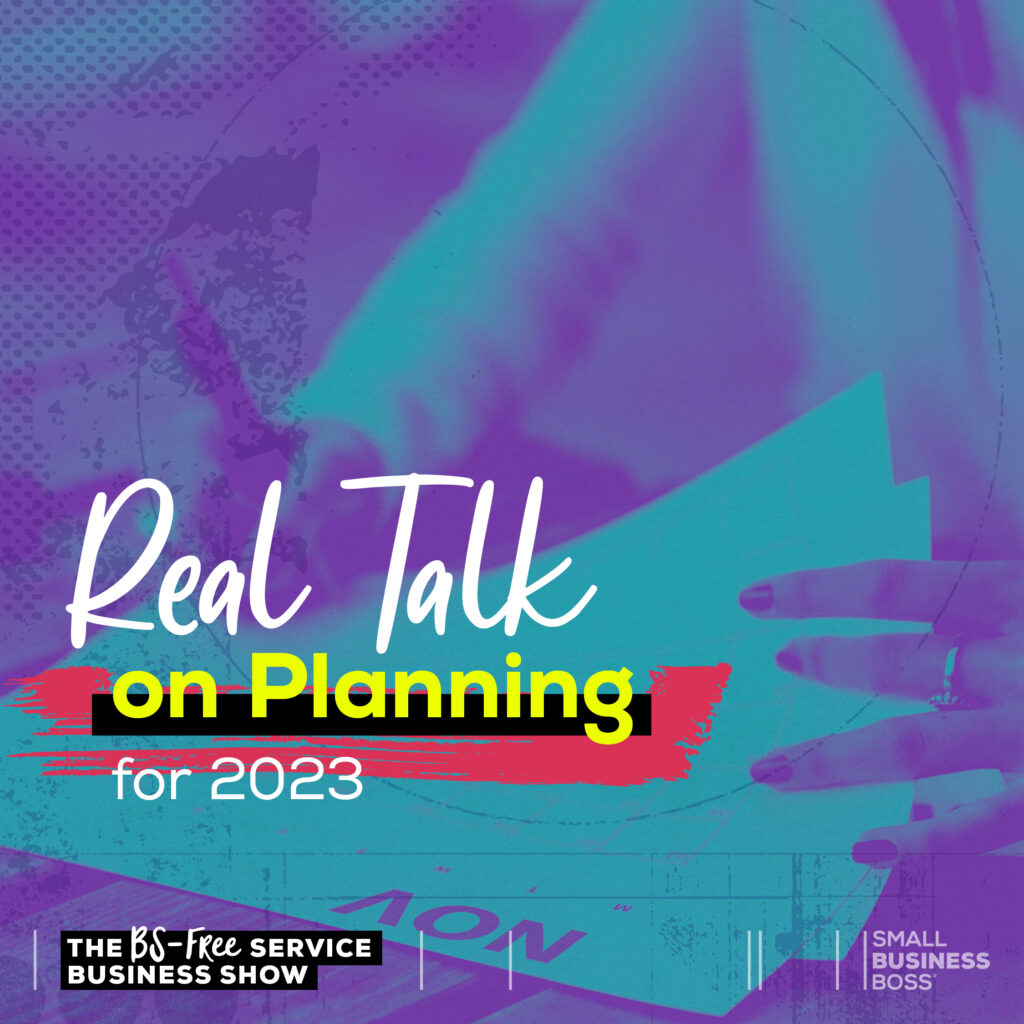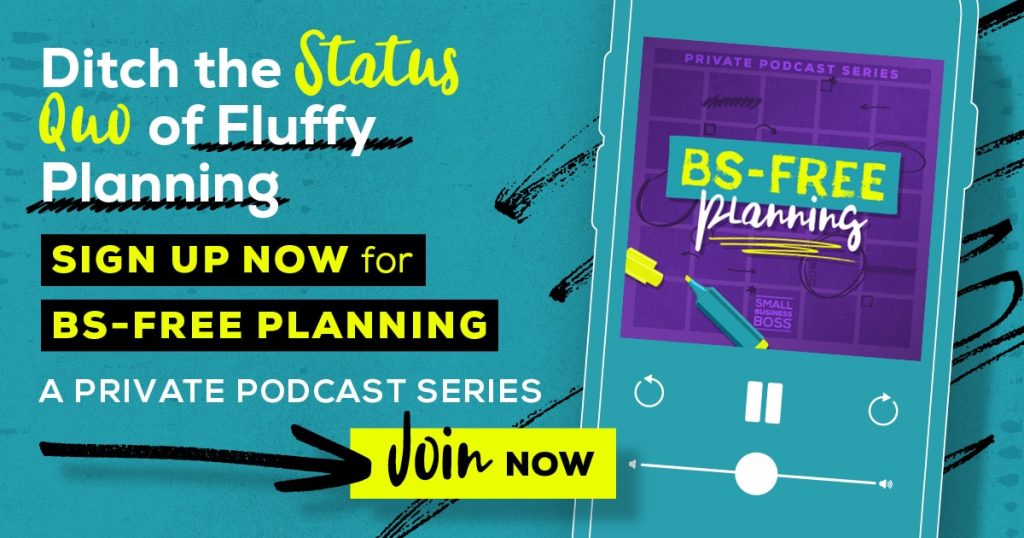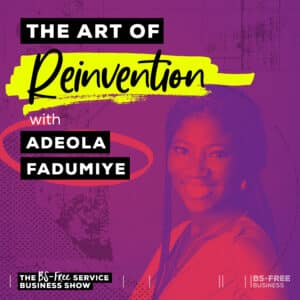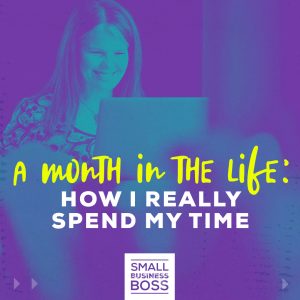
Search the site:
Real Talk on Planning for 2023
Planning season is upon us. Love it or hate it, it’s a whole thing for us as business owners. In this episode, we’re going to get real about planning for 2023.
The real name for this episode should be let’s cut the BS for your planning for the coming year, because friends, it’s been a year. I love planning. I’m a planner to my core. But also, I cannot stand the arbitrary nature of November and December being planning season because of the end of the calendar year.
If planning feels like it’s putting a lot of pressure on you, you’re going to love the permission slip you get to do this your way in this episode. And if you love planning, you’ll get a few fresh ideas for thinking differently as you head into 2023.
My goal for you is to help you nail down what will make the most difference for you in the coming year and not get sucked into things that waste your time, money, and energy. This isn’t about hating on planning, but instead skipping the hype.
My Planning Backstory
Now, if you know anything about me, you probably know I’m someone who loves to plan. I love to have a routine. I love to know what to expect.
But I’m also a creative person and an Enneagram 8 so I tend to rebel. The truth is it can be complicated, and I’m sure many of you can relate.
A lot of my inspiration for WHY I’m talking about is very personal. I recognized a few years ago that the end-of-year planning push (and constant BEST YEAR EVER hype) was making me feel like crap.
There are a lot of reasons why this is starting with the fact, I live in Canada, so December is dark, it’s cold, and it coincides with holiday celebrations. Plus, I struggle with Seasonal Affective Disorder so I’m not always at my best in the winter months, and honestly, I’m never 100% sure how I’m really going to feel the first two months of the year.
A couple of years ago I was gearing up to spend a lot of time planning for the year to come and I just couldn’t do it. I had new pens, a new notebook, and even some awesome snacks. But I just wasn’t feeling it.
So I only did the basics and tapped out. I didn’t plan until late February and it ended up being one of the better decisions I’ve made because I just didn’t have the capacity in December for the plan, but a few months into the year I was ready to go!
This was absolutely an accidental discovery for me, but since then I’ve come to realize that planning for your business can be an activity you do whenever it works for you.
Especially as the planning industry (which is a subset of the $13 billion dollar a year entrepreneurship market) is motivated to use the end of the year to create demand for their products, programs, services, and retreats.
We’re subjected to an endless stream of messages about how we need to plan now for the best year ever. At every turn, we’re being sold something to help us with planning.
I’m never going to deny that planning has value. It’s just that so many planning products exist from paid workshops to planners that we’re overwhelmed with information.
But there are some big old planning problems that I want to dive into.
#1. Your Goals Don’t Fit Your Life
One of the biggest problems I see with planning is how these approaches (and products) don’t fit with our lives. It’s so focused on business-specific goals, that it fails to take into account our personal needs.
As true micro business owners, our business goals should support our lives, and not the other way around.
Your life goals should come first, and not be put on hold for your business. Everything I talk about from here on out should be filtered through this lens of your life coming first.
Especially those big-picture business goals like revenue that are pushed at us relentlessly and can often get tied up with our worth. For us to set goals with meaning that actually matter, we need to untether ourselves from external measures of success and figure out how this all fits with our lives.
No revenue goal or business accomplishment will be worth it if it’s at the expense of the rest of our lives.
#2. You Use Planning as Procrastination
A common thing with planning (especially if you like it) is that you’ll use it as a way to avoid doing real work in your business.
Enter procrasti-planning, where we keep planning and planning and planning as a way to put off doing the actual work.
Listen, I get it. Planning is fun and can feel like you’re doing work, but there’s a point at which you’re simply using it to avoid doing the things that need to be done.
So before you do any planning, I encourage you to carefully think about what planning actually will help you move things ahead, and which ones are just busy work.
#3. Poor Fit Business Goals
Another really common, and related, planning problem is how we set the wrong goals for our type of business, our values, our work style, our skills, or even our brains.
As much as I don’t want to label any goals as being “wrong”, there’s often so much external input and influence that leads us towards goals that simply aren’t aligned with our actual business or personal needs.
These may be goals related to things that aren’t aligned with what we really want such as a revenue goal that will require us to hustle hard to get it, or goals that don’t fit our business stage or model and keep us stuck doing busy work.
A prime example of this is for service businesses: there are a few specific things that are typical growth areas such as marketing, sales, and services. So you need to figure out for your stage of business what goals and actions will help you get where you want to go.
And remember, as a service business owner, you’re not only working towards your own business goals but that of your clients, so your time to work ON the business is limited. As a result, the way you plan needs a fundamentally different approach.
#4. Setting Too Many Goals
Speaking of goals, another common planning challenge is that we set too many goals. I get it, it’s easy to over plan things because you want it to be certain.
It’s extremely hard to focus when you have multiple goals at play at once, and something is going to suffer. We need to prioritize goals so we can invest our energy into a handful of things, and not a laundry list that only gets a sliver of our attention.
I want to remind you that planning is not a one-time event, so you don’t have to plan it all right now! It’s an ongoing activity that requires care and feeding each month and quarter, so anytime can be a time to plan.
I personally like to do a few things for the full year, but most of my planning I do quarterly. That approach lets me calibrate and course correct as the year goes on. I’m constantly learning and adjusting based on what I learn, so planning only 12 weeks at a time saves me time and more importantly, effort.
Build Skills By Focusing on Practices, Not Goals
As we wrap up, I want to end this on a positive note with a focus on what things you could be planning without this need to completely overdo it. Some of the things I say next may surprise you, but I believe your planning should be simple. Building a sustainable business requires baseline items to run effectively on a day-to-day basis.
That’s why I want you to think about each of these things as being less about goals, and more about building baseline practices in your business.
Money Practices
First, let’s talk about money. it’s a necessary part of this process. I want you to think of this in terms of money practices and less about specific goals.
Yes, your revenue goal is important, but there are other practices that are essential to meeting that goal. That starts with having a revenue forecast and a budget as these are tools that help you with the HOW of that goal.
If you’re feeling overwhelmed, don’t worry, I’ve got you. Start by looking at last year’s revenue numbers so you can calculate:
- Average monthly revenue
- Average monthly expenses
- Average monthly pay
Use those numbers as a basis for your revenue goals and then work on backing them up with your forecast and budget.
And a reminder here, we’re keeping it real, so doubling or tripling your business every year is NOT a realistic goal. I want to normalize making it through another year of entrepreneurship and celebrating 10% or 20% year-over-year growth. Because spoiler alert, that’s how REAL and normal businesses are actually built.
Capacity Practices
The truth about your capacity is that you only have so much time, and there’s a cap on how much you can work.
This is why I’m not a fan of over-the-top revenue goals, as time tends to be the thing that gets sacrificed in the mix. We decide to hustle our way to our goals, and if we finally get there, it feels empty as we’re too exhausted to care, let alone celebrate.
When it comes to capacity, typically we think about it from the perspective of time as it’s a non-renewable resource.
But we need to also consider our energetic and emotional capacity as part of the question of capacity, as the time you invest in your business is impacted by your energy and emotions. Sure, you can put in the time, but if you don’t have the energy or emotional cycles to do it, you’re going to be spinning your wheels.
So, let’s talk about capacity within your business as a factor of time, with the reminder about your energy/emotions in mind.
A good place to start is how much you want to work in a given week. Having a set goal of hours per week that you’re willing to commit to your business helps create a clear container.
With that number in mind, consider if you’re actually hitting that goal right now.
If you’re not sure how much you’re really working, I encourage you to do a time-tracking exercise for several weeks using a tool like Toggl or Rescue Time. Even if you’re not in the habit of tracking your time, you need data to see what’s really happening.
A few scenarios have likely popped up based on your capacity:
- You’re working more than you want to be and you’re feeling maxed out with your current client load.
- You’re working the number of hours you want to work, but you’re not sure how you can grow without working more.
- You’ve got the additional capacity, but you don’t have the client load to fill that time.
Each one of these can be managed in different ways from pricing to boundaries to marketing, but if you’re not focusing on your capacity, you can’t make these adjustments.
This is why it’s so important that you build practices around your capacity. You need to keep an eye on your time, your schedule, your workload, and more. This may require you to track your time or learn how to rest.
What Other Practices Do You Need?
As we wrap up, I want to remind you that your planning should support you every step of the way. Not just as a business owner, but in all the other roles you play in your life, and as a full human.
With that, I want to leave you with a few questions:
- When does it feel good for you to plan?
- What type of planning do you want to do?
- How can you ensure your plans better support you?
- Where may you be running into trouble spots around your planning?
- What practices do you need to support your plans for the year?
Maybe you’ll plan now, maybe you’ll plan later. You get to choose no matter how much hype there may be that 2023 should be our best year ever.


I’m Maggie Patterson (she/her), and services businesses are my business.
I have 20+ years of experience with client services, am a consultant for agency owners, creatives, and consultants, and vocal advocate for humane business practices rooted in empathy, respect, and trust.
Read or Listen to the Latest
For Solo Business Owners

Growing a solo service business is tough.
It’s even harder when you’re bombarded with BS advice that steers you away from your values and why you started your business in the first place.
This is the podcast for solo creatives and consultants who want to remain as a team of one and have zero interest in the hustle and grind of typical business teachings.
Subscribe now and never miss an episode.
For Micro Agency Owners
Most podcasts for agency owners obsess over revenue growth as the ultimate success metric.

But here’s the truth: not everyone wants to make millions. Your goal might be to build a sustainable business that lets you have a life and doesn’t run you into the ground.
Join me as I spill my shameless confessions and share everything I’ve learned about building a micro agency that skips the BS of tired and typical agency teachings.
Follow Now on All Major Podcast Platforms








